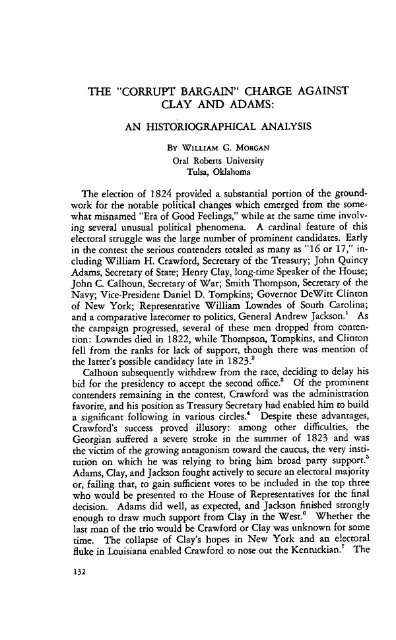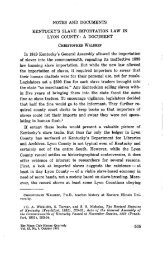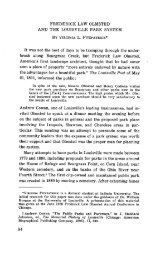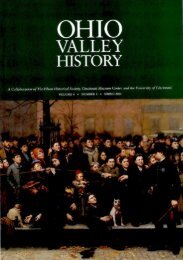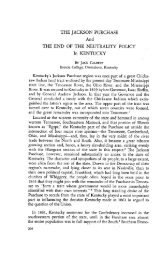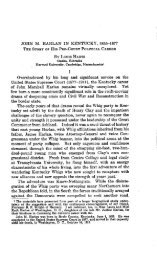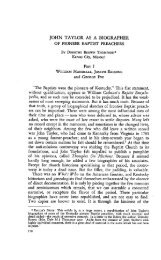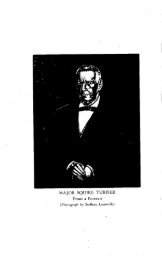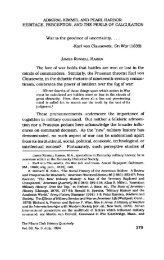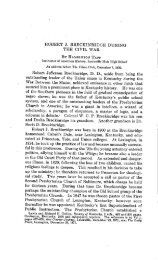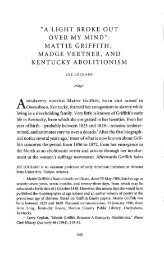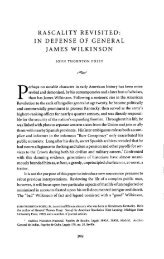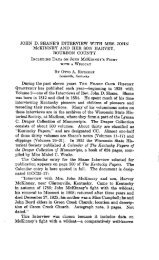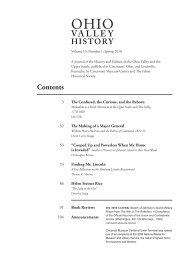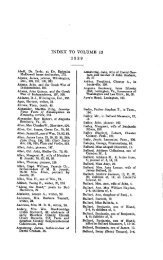"CORRUPT BARGAIN" CHARGE AGAINST CLAY AND ADAMS
"CORRUPT BARGAIN" CHARGE AGAINST CLAY AND ADAMS
"CORRUPT BARGAIN" CHARGE AGAINST CLAY AND ADAMS
You also want an ePaper? Increase the reach of your titles
YUMPU automatically turns print PDFs into web optimized ePapers that Google loves.
THE "<strong>CORRUPT</strong> BARGAIN" <strong>CHARGE</strong> <strong>AGAINST</strong><br />
<strong>CLAY</strong> <strong>AND</strong> <strong>ADAMS</strong>:<br />
AN HISTORIOGRAPHICAL ANALYSIS<br />
BY WILLIAM G. MORGAN<br />
Oral Roberts University<br />
Tulsa, Oklahoma<br />
The election of 1824 provided a substantial portion of the groundwork<br />
for the notable political changes which emerged from the somewhat<br />
misnamed "Era of Good Feelings," while at the same time involving<br />
several unusual political phenomena. A cardinal feature of this<br />
electoral struggle was the large number of prominent candidates. Early<br />
in the contest the serious contenders totaled as many as "16 or 17," including<br />
William H. Crawford, Secretary of the Treasury; John Quincy<br />
Adams, Secretary of State; Henry Clay, long-time Speaker of the House;<br />
John C. Calhoun, Secretary of War; Smith Thompson, Secretary of the<br />
Navy; Vice-President Daniel D. Tompkins; Governor DeWitt Clinton<br />
of New York; Representative William Lowndes of South Carolina;<br />
and a comparative latecomer to politics, General Andrew Jackson] As<br />
the campaign progressed, several of these men dropped from contention:<br />
Lowndes died in 1822, while Thompson, Tompkins, and Clinton<br />
fell from the ranks for lack of support, though there was mention of<br />
the latter's possible candidacy late in 1823. 2<br />
Calhoun subsequently withdrew from the race, deciding to delay his<br />
bid for the presidency to accept the second office.8 Of the prominent<br />
contenders remaining in the contest, Crawford was the administration<br />
favorite, and his position as Treasury Secretary had enabled him to build<br />
a significant following in various circles.4 Despite these advantages,<br />
Crawford's success proved illusory: among other difficulties, the<br />
Georgian suffered a severe stroke in the summer of 1823 and was<br />
the victim of the growing antagonism toward the caucus, the very instination<br />
on which he was relying to bring him broad party support. 5<br />
Adams, Clay, and Jackson fought actively to secure an electoral majority<br />
or, failing that, to gain sufficient votes to be included in the top three<br />
who would be presented to the House of Representatives for the final<br />
decision. Adams did well, as expected, and Jackson finished strongly<br />
enough to draw much support from Clay in the West.° Whether the<br />
last man of the trio would be Crawford or Clay was unknown for some<br />
time. The collapse of Clay's hopes in New York and an electoral<br />
fluke in Louisiana enabled Crawford to nose out the Kentuckian.; The<br />
132
1968] Corrupt Bargain" Charge Against Clay and Adams 133<br />
role of Henry Clay was thus changed from candidate m bystander--a<br />
bystander, however, whose position as Speaker of the House would<br />
make him extremely influential in selecting the victor, s<br />
Clay's standing with the friends of the candidates reached a new<br />
high--at least on the surface. He was badgered by attempts to secure<br />
his support, and various spoils were mentioned if the appropriate arrangements<br />
should be made. The "jockeying" for position was phenomenal,<br />
though perhaps only to be expected in such circumstances.<br />
In short, the Kentuckian was welcomed by a multitude of pleadin§<br />
voices when he returned to Washington for the convening of Congress.<br />
Clay faced an obviously important decision, but his choice to support<br />
Adams appears to have been almost inevitable. Crawford was eliminated<br />
for a variety of reasons, notably his precarious health. 1° Much<br />
ill feeling, moreover, had passed between Clay and Jackson, and the<br />
Speaker was also strongly against seeing a military man occupy the<br />
White House. 1 A factor which both commended and condemned Old<br />
Hickory was that he represented the rising aspirations of the Trans-<br />
Allegheny region. As a fellow Westerner, Jackson might have appealed,<br />
at least slightly, to the Speaker's sectional pride but certainly<br />
not to his self interest: the Hero was an obvious rival for support in the<br />
expanding West.<br />
Adams seems to have been the best choice--by a process of elimination,<br />
if for no other reason. Though bad will between Clay and the<br />
Secretary of State went back as far as the Anglo-American treaty negotiations<br />
at Ghent, their disagreements could be reconciled more easily<br />
than those between Clay and Jackson. 12 In addition, the domestic and<br />
foreign policies of Adams and Clay were similar; both believed in internal<br />
improvements and a protective tariff and had similar views<br />
toward the new Latin American republics. 13 Doubtless the Speaker<br />
also believed that his chances to follow a New Englander were<br />
greater than if he attempted to succeed a fellow Westerner. Whatever<br />
his reasons, Clay appears to have made an early decision to support<br />
Adams, 4 and, despite the Kentucky legislature's instructions to the congressional<br />
delegation to vote for Jackson, he remained true to this<br />
determination--though selecting Adams with the dubious distinction<br />
of being a "choice of evils.''15 One could scarcely expect Harry of the<br />
West to preside with unmixed feelings over the choosing of another<br />
man for the office he so ardently desired.<br />
A sensation was produced in the House of Representatives in January<br />
of 1825 by the report that Clay would back Adams; a commotion<br />
was natural since the decision had been a guarded secret. TM Shortly<br />
after Clay's choice was made public, an anonymous letter accusing the<br />
Speaker and the Secretary of State of a bargain appeared in a Phila-
134 The Filson Club Histor Quarterly [VoL 42<br />
delphia newspaper, the Columbian Observer. 1 Clay vigorously denied<br />
the charge and demanded that the author identify himself. Representative<br />
George Kremer of Pennsylvania acknowledged that the letter was<br />
his and indicated his desire and ability to substantiate his position before<br />
the House investigatory committee requested by Clay. But when the<br />
time for such action arrived, Kremer declined to testify. TM<br />
Despite the unsavory allegations, the Kentuckian maintained his decision<br />
and cast his influence toward Adams, who won in the House on<br />
the first ballot. After considerable thought and consultation, Clay accepted<br />
the President-elect's offer of the State Department. His decision<br />
brought forth more cries of "corruption and sale" from many Jackson<br />
supporters, and Old Hickory himself referred to Clay as "the ludas of<br />
the West.'' 9 One of Clay's friends warned him that because of his<br />
support of Adams "a thousand desperadoes, political and military . . .<br />
would think it a most honorable service to foster a quarrel upon and<br />
shoot you." He went on to indicate that Clay would have been condemned<br />
no matter which candidate he chose to support: "You prefer<br />
Mr. Adams... and for that you are calumniated and so it would have<br />
been had you announced your preference for either of the other competitors.''2°<br />
Some disappointed partisans were arrested in Pittsburgh<br />
because of a riot committed in burning the Kentuckian's effigy.2. Such<br />
activity was prophetic: Clay and Adams never escaped the charge, and<br />
it was one of the Jacksonians' most effective weapons in their victory<br />
over Adams in the election of 1828, despite James Buchanan's refusal<br />
to corroborate Old Hickory's belief that he was Clay's agent in an attempt<br />
to bargain with Jackson himself,m<br />
Though many totally rejected the idea, Jackson always considered the<br />
accusation to be true, as did others. Some, no doubt, were less convinced<br />
of the truth of the "corrupt bargain" charge than of its utility<br />
as a political weapon. Used with great facility in 1828, the allegation<br />
provided an obstacle to Clay whenever his presidential fever grew particularly<br />
acute.28 In any event, the question is highly controversial,<br />
and historians have not always concurred on the point. The purpose<br />
of this article is to examine how non-biographical studies present the<br />
subject.24<br />
Writers of the multi-volume works have generally dismissed the<br />
charges as false; their similar conclusions are often based on rather<br />
different sources, however. Hermann Edward yon Hoist is among those<br />
commentators to whom political development meant a great deal. In<br />
his eight-volume work, The Constitutional and Political History o[ the<br />
United States, Clay's conduct throughout the entire election period is<br />
staunchly defended. To Von Hoist, the Speaker is exonerated by several<br />
proofs: George Kremer's refusal to'testify before the House investi-
1968] • "CorruptBargain" Charge Against Clay and Adams 135<br />
gating committee after having identified himself as the author of the<br />
letter to the Columbian Observer, T. H. Benton's public statement that<br />
an early decision had been made to support Adams, and a letter from<br />
James Buchanan which refused to corroborate Jackson's insistence that<br />
he was the agent of Clay who offered Old Hickory a bargain. 2 "Con<br />
Hoist admits, however, that the Speaker's position of influence in the<br />
House enabled the Jackson forces to use the "libelous charges" with<br />
effectiveness. Despite the evidence indicating no corruption, the "base<br />
lie remained a great impediment in the way of... Clay .... The<br />
accusation was . . . entirely baseless." The author concludes by expertly<br />
refuting the Jacksonians' claim that their chief deserved to win<br />
because of his popular and electoral plurality. If such were the case,<br />
he suggests, there would scarcely be need of a House election.26<br />
In his multi-volume history, Edward Channing suggests that cooperation<br />
between Jackson and Clay was virtually out of the question: the<br />
Speaker had openly attacked Old Hickory regarding the latter's activities<br />
in Florida, and Jackson had never forgiven such an overt affront.<br />
On the other hand, it was "entirely natural for Adams and Clay to<br />
coalesce." After all, Channing notes, they both believed in the American<br />
System, distrusted Crawford, and shared a common lack of faith in<br />
Jackson's administrative abilities. It was to be expected, therefore, that<br />
Adams would receive Clay's support. The author gives rather cavalier<br />
treatment to remaining aspects of the question, merely mentioning<br />
Kremer's charges and subsequent refusal to testify before the House.<br />
He does admit, however, that this "discreditable business" hurt the<br />
careers of both Clay and Adams.2<br />
John Bach McMaster ventures one step further in defending the<br />
Speaker. He not only justifies Clay's actions, but also accuses the Jackson<br />
forces of concocting the charges of corruption as a scheme to ruin<br />
the Kentuckian politically--or better yet, to scare him into supporting<br />
his fellow Westerner for President. McMaster recounts the Kremer<br />
charge and related events, noting both Clay's vehement denial and<br />
Kremer's reticence when summoned by the House Committee.2s<br />
Despite Clay's acceptance of the State Department, a bargain was<br />
scarcely involved. The decision as to whom he should support was<br />
relatively easy. Crawford was eliminated by poor health, and "to vote<br />
for Jackson was impossible" because of Clay's rather impassioned denunciation<br />
of the General's conduct in the Seminole War. That left<br />
the New Englander and "during all this while Clay never faltered in<br />
his determination to support Adams." The author also indicates the<br />
adverse opinion entertained by Harry of the West toward the election<br />
of a military hero. As in most of the previous works discussed, Mc-<br />
Master unfortunately fails to refer to Adams' diary. In any case, he
136 The Filson.Club History Quarterly [VoL 42<br />
fails to prove his allegation that the charges were more than an honest<br />
misunderstanding on the part of Jackson's friends. The author does<br />
devote sufficient space to the extensive use of the charges in the subsequent<br />
presidential contest, noting that "the issue on the charge of corrupt<br />
bargain... [was] made the platform for the election yet almost<br />
four years away. ''29 In this instance, it was not hard to keep good men<br />
down.<br />
In his seven-volume magnum opus, James Schouler takes a rather<br />
indecisive position. After mentioning Clay's important influence in<br />
determining the victor, he digresses to indicate his belief that the President<br />
should be selected by a plurality of the popular vote, thus preventing<br />
any umpire from entering the fray. On record against the idea of a<br />
House election, the author proceeds to describe one. Relying largely<br />
on Adams' diary, he concentrates on the relationship of Clay and his<br />
friends with the candidate. Though mentioning Clay's letter to Francis<br />
P. Blair on January 8 expressing preference for Adams, he neglects<br />
earlier declarations of a similar nature. He very briefly discusses the<br />
Kremer charge but omits reference to the House investigating committee.<br />
Jackson's denunciation of Clay as the "Judas of the West" is<br />
also noted. Schouler draws no conclusions, apparently leaving the<br />
choice to the reader. The reader will likely fail to decide the question<br />
as well: neither side of the story is treated effectively enough to permit<br />
a conclusion. °<br />
Later in the volume, however, the author finally takes a definite<br />
stand. He suggests that "Clay and Adams were men of probity," and<br />
this, in addition to their profuse denials, should dispel any thought of<br />
corruption. He at last chooses to point out Kremer's equivocal position<br />
and suggests that a visit of James Buchanan to Clay was an unsuccessful<br />
attempt to seduce the Speaker to Jackson's side by a similar<br />
deal supposedly offered, Old Hickory's men charged, to the General.<br />
Schouler ultimately settles on a moderate position by concluding that<br />
a tacit understanding likely existed between Clay and Adams. He<br />
exonerates the principals of evil motives, pointing to the discord with<br />
Jackson and Crawford's bad health as sufficient reasons to throw the<br />
Speaker into the Puritan's camp. 1<br />
At this juncture, we move to works of a more delimited nature.<br />
Frederick Jackson Turner's Rise o/the New IVest, 1819-1829 gives a<br />
balanced viewpoint on the question. Though deciding that no corrupt<br />
bargain existed, Turner nevertheless mentions that friends of Clay attempted<br />
to convey to Adams the Westerner's friendly attitude and their<br />
hope that a cabinet position would be in order. To these overtures,<br />
Adams replied that if he were elected by Western votes, it would be<br />
only natural to look to that section for continuing support--thus indi-
1968] "Corrupt Bargain" Charge Against Clay and Adams 137<br />
caring a post would be in the cards for Clay. The author notes Adams'<br />
diary entry--f Incedo super ignes" (I walk over fires)--without implying<br />
that this statement incriminated the diarist. He also labels the<br />
conferences between Clay and Adams as simply to express their respective<br />
positions on certain matters of public policy. In any case, Clay<br />
had long been hostile to Jackson and could not easily reverse his position.<br />
Moreover, it would have been mote difficult to succeed a fellow<br />
Westerner as President. Crawford had been eliminated because of his<br />
health; only Adams remained. Their similar attitudes toward domestic<br />
and foreign policy made Clay's choice of the Puritan entirely logical,m<br />
Turner also discusses the original charge, Clay's demand for an investigation,<br />
and Kremer's reluctance to testify. He suggests that Jackson's<br />
managers engineered the latter, hoping that the accusation would<br />
gain credence with the masses if it were not investigated and Clay subsequently<br />
accepted the State Department folio. If he refused the appointment,<br />
it could have been noised abroad that Kremer's discovery<br />
of the truth prevented the conclusion of the evil scheme. The author<br />
fails to pursue this point further, however, but reviews Clay's attempts<br />
to justify his course of action. Turner notes that though Clay named<br />
associates to whom he mentioned his early decision for Adams and no<br />
substantial proof appeared to justify Kremer's charge, he was long beset<br />
by this matter. In any case, the author feels the appointment of the<br />
Speaker as Secretary of State was extremely unwise--this was, he suggests,<br />
what gave the charge immortality,as<br />
Edward Stanwood's History o[ the Presidency gives a rather brief<br />
treatment to the corruption allegations. Stanwood mentions both the<br />
article in the Columbian Observer and the consequent events. Concluding<br />
that Clay and Adams were innocent, the author notes Buchanan's<br />
failure to substantiate Jackson's claim that he was a messenger<br />
bearing a wicked offer from Harry of the West and Thomas H. Benton's<br />
statement that Clay confided to him before December 15 of his choice<br />
for the Puritan. He neglects the salient reasons why this decision was<br />
made, however, but does note the effective use of the charge in the<br />
succeeding campaign.34<br />
Another historian of the presidency, Meade Minnigerode, devotes<br />
more attention to the question. Staunchly defending Clay, he points<br />
out that the Speaker made his decision for Adams early in the contest.<br />
The author also lists a number of reasons why this determination was<br />
made: Crawford's health, Clay's aversion to Jackson's military background,<br />
the greater possibility of succeeding a New Englander, and the<br />
Secretary of State's more impressive qualifications. These considerations<br />
were so weighty that Minnigerode concludes "it would have been an
138 The Filson Club History Quarterly ' [Vol. 42<br />
extraordinary thing ff Mr. Clay had not decided to support Mr.<br />
Adams.''ss<br />
Minnigerode also discusses the various offers, whether or not authorized,<br />
made to Clay by friends of the candidates. Of particular interest<br />
is Buchanan's visit to Clay in which he intimated that Jackson would<br />
surely appoint his fellow Westerner as Secretary of State. In addition,<br />
Adams was by no means idle. He gave assurances to such men as<br />
Daniel Webster, John Scott of Missouri, and Daniel P. Cook of Illinois<br />
on different matters, and Robert P. Letcher, a close colleague of Clay,<br />
received numerous hints that the New Englander was inclined favorably<br />
toward the Speaker. Yet he maintains that no bargain was concluded;<br />
Adams' diary is used to substantiate this position. George Kremer is<br />
depicted as the dupe of Jackson's managers when he first charged corruption,<br />
then refused to testify on the matter. The author also notes<br />
that many rallied to Clay's defense, including such respected statesmen<br />
as Webster, Lewis Cass, John Tyler, and Chief Justice Marshall. Another<br />
proof of Clay's innocence was Buchanan's response to Jackson's<br />
attempt to involve him as a material witness for the prosecution: "Mr.<br />
Buchanan had completely demolished the Jacksonian case." Yet Old<br />
Hickory refused to drop the charge; the "cry rang out more loudly<br />
than ever before." Jackson's managers thus attempted to cover their<br />
weakened position by increased activity,s°<br />
George Dangerfield has an extensive analysis of this political "bad<br />
feeling" in his The Era o Good Feelings. Noting Clay's position of<br />
influence in the House, he points out that the Speaker and Adams had<br />
"never been on good terms since the day when they had shouted insults<br />
at each other, at Ghent." In addition, Clay had made a virtually irreparable<br />
break with Jackson concerning the Seminole campaign; with<br />
Crawford "he had nothing in common at all." Having briefly set the<br />
stage, he admits that Clay told some friends before returning to Washington<br />
that he would "never vote for Jackson." The author reports<br />
Letcher's visits to Adams and the latter's "Incedo super ignes" diary<br />
entry and observation that Clay would back him if he could advance<br />
himself by doing so. In a bit of postmortem psychoanalysis, the author<br />
suggests that Adams was bothered by his conscience and the haunting<br />
realization that he could not be elected without seriously compromising<br />
his principles. In fact, by the conference arranged between the Puritan<br />
and Clay "the year began with Mr. Adams walking, not over the fires,<br />
but into them. ''87<br />
Dangerfield then accuses Buchanan of urging Jackson to make it<br />
known that Adams would not be continued as Secretary of State; such<br />
a statement would supposedly have caused Clay to support the Tennessean<br />
without delay. Despite the rather indefinite reply, the Penn-
1968] "Corrupt Bargain" Charge Against Clay and Adams 139<br />
sylvanian ostensibly hurried m Clay with an offer of the State Department<br />
if he would support General Jackson. Buchanan was acting,<br />
Dangerfield says, on his own authority, and Jackson should thus be<br />
absolved from any blame. In fact, Dangerfield intimates that Jackson<br />
"was personally determined to have the Presidency without a bargain<br />
or not to have it at all." By contrast, Adams was too possessed by<br />
presidential fever to reject "an understanding with Henry Clay." Thus<br />
an agreement did, in fact, occur suggests the author, and "if Adams had<br />
resisted it, Jackson would have been elected." Briefly noting the good<br />
reasons why Adams would logically coalesce with Clay, Dangerfield<br />
suggests that because of these factors "John Quincy Adams stifled his<br />
conscience and prepared to come to an understanding with Henry Clay."<br />
The tone of the narrative thus involves strong implications of definite<br />
bargain.as<br />
The author continues to focus on factors suggesting a bargain by<br />
mentioning Clay's statement that some of Adams friends--no doubt<br />
without his authority--had sought the Speaker's aid by urging<br />
"considerations personal m himself." In this oblique fashion, the "per.<br />
sonal considerations" remained in the picture. We are forced m conclude<br />
that the two men came to an understanding--but an understanding only,<br />
not a bargain: not the Presidency for the State Department in so many<br />
words... But no bargain, after all, was necessary; for an understanding,<br />
like charity, covers a multitude of sins.<br />
Dangerfield then proceeds to depict the results of the "alliance," as he<br />
terms it, and notes concessions made by Adams to other political factions<br />
as well. s°<br />
The writer then plods through the Kremer accusation, but while admitting<br />
that "Honest George" probably did not draw up the charges, he<br />
neglects to mention that the Pennsylvania congressman subsequently<br />
refused to testify before the House investigating committee requested<br />
by Clay, despite his earlier promise to do so.4° Dangerfield also recounts<br />
the role of Representative Stephen Van Rensselaer in deciding<br />
by his vote the choice of the New York delegation, which secured the<br />
election for Adams. But the author does view the Puritan with some<br />
sympathy:<br />
It was terrible for John Quincy Adams to be entangled with a man like<br />
Henry Clay . . . like a dram-drinker whose ordinary life is usually spent<br />
in dull sobriety, he followed one intoxicating expedient after another;<br />
and the more intoxicated he grew, the more his doleful inner voice aSsured<br />
him that nothing good would come of it.4.<br />
The final curtain is drawn when Dangerfield asks that Clay and<br />
Adams not be judged harshly, became "if corruption existed" it was an
140 The Filson Club History Quarterly [Vol. 42<br />
inevitable part of politics. But political morality has changed considerably<br />
since 1825; even the principal characters themselves denounced<br />
any bargain of this nature as despicable and unworthy of public officials<br />
42 The author suggests Adams never forgave himself for this<br />
compromise of conscience in order to come to grips with political<br />
reality. Clay, however, was genuinely astonished when the cry of<br />
"bargain and corruption" failed to fade away. In fact, the Kentuckian<br />
was harmed by the charge for many years and spent considerable effort<br />
attempting to refute it. Indeed, Dangerfield implies that Clay received<br />
what he deserved by wantonly disregarding and misevaluating the force<br />
of public opinion favoring the dynamic Old Hickory over the stern<br />
Puritan. His "tragic offense" of 1825 was to remain a significant roadblock<br />
whenever Harry of the West gazed longingly toward the White<br />
House. 4a<br />
In his various conclusions relative to the case, Dangcrfield has likely<br />
raised several questions in the reader's mind. He has indicated, for<br />
example, that Jackson would not accept a bargain. Yet it is suggested<br />
that if Adams had refused the agreement offered by Clay and company<br />
--as his conscience supposedly told him to do--the alleged bargainhunting<br />
Kentuckian would have acted in such a way that Old Hickory<br />
would have been elected, despite Clay's early declarations that he definitely<br />
would not vote for the General. If faced with this hypothetical<br />
rejection by both Adams and Jackson, Clay would seem to have had<br />
little choice but to support the New Englander anyway. Both his self<br />
interest and what he thought best for the nation pointed toward such a<br />
course. In addition, one may wonder about semantics: by saying that<br />
Jackson would have been chosen had Adams resisted an understanding<br />
between the men covered a "multitude of sins," Dangerfield has clearly<br />
implied that there was a bargain, whatever he might choose to call it.<br />
The same author's more recent treatment of the question is but a<br />
slightly varied distillation of the first. Dangerfield notes that Clay's<br />
coming in fourth in the electoral college tally put him in a crucially<br />
important position in deciding the ultimate victor, though losing the<br />
chance to come before the House himself and make the election "even<br />
more of a wizard's sabbath than it actually became." That the Speaker<br />
considered ideal none of the trio to be presented to the House is made<br />
clear. He was not on good terms with Adams, while having broken<br />
openly with Jackson on the Florida question. For Crawford's Radicalism,<br />
"he had no appetite at all." Yet early in the situation Clay began<br />
to lean toward the lesser of the evils: Adams. He told his friend<br />
Thomas H. Benton of this feeling even before December 16, when the<br />
vote of Louisiana was known in Washington. In addition, Adams'<br />
diary for December 17 and 23 records the visits of Robert P. Letcher,
1968] "Corrupt Bargain" Charge Against Clay and Adams 141<br />
one of the Speaker's associates, which strongly suggested a decided preference<br />
for the Puritan. On January 9, Clay and Adams finally met for<br />
their conference. The New Englander's diary account of the conversation<br />
simply notes that Clay wanted to ask about "some principles of<br />
great public importance, but without any personal considerations for<br />
himself." The Kentuckian freely informed Adams that he preferred<br />
him above either Jackson or Crawford.44<br />
Yet--perhaps because of an overzealous attempt at analysis (or<br />
post-mortem psychoanalysis)--Dangerfield does not let the situation<br />
remain simple, one which resulted somewhat naturally from the very<br />
state of things. Possibly because the author subseqently weighed the<br />
Adams-Clay governmental program in the balance and found it wanting,<br />
the magic word "bargain" must enter in somewhere: "We have<br />
every reason to suppose that the two men came to an understanding;<br />
but surely it must have been an understanding only, an implicit but<br />
not an overt bargain, not the Presidency for the State Department in so<br />
many words. Clay would have thought such a bargain naive and<br />
Adams would have considered it sinful." One wonders why, semantically<br />
speaking, an understanding of this nature must be termed a<br />
"bargain" of any kind, especially in view of the unsavory connotations<br />
associated with the word in this context. Dangerfield appears to be<br />
dearly saying there was, in fact, no corruption, but he leaves a haunting<br />
doubt merely by using the word "bargain.''45<br />
The discussion also briefly recounts Kremer's charge in the Columbian<br />
Observer, but the fact that "Honest George" offered to testify before<br />
the House on this matter and later refused goes unmentioned.<br />
After discussing the intricacies of the House election (with an emphasis<br />
upon the role of Stephen Van Rensselaer),4 Dangerfield describes,<br />
in somewhat abbreviated fashion, some reactions to the outcome: John<br />
Randolph declared that "the cards were packed," while Old Hickory<br />
branded Clay as "the Judas of the West." From that time on the Kentuckian<br />
was to be faced with such charges of corruption.47<br />
But what of Adams? Throughout his treatment, Dangerfield has<br />
imputed queasy feelings to the Puritan because of certain entries in his<br />
diary.4s He concludes that Adams' conscience was indeed tormented,<br />
even more because of his other "deals''4° than by his relationship with<br />
Clay. The New Englander "could not forgive himself for conniving,<br />
for electioneeting, for behaving like anyone else." Yet the analyst indicates<br />
Adams firmly believed Jackson's election would be against the<br />
nation's interest, while he himself would make a suitable chief execufive.<br />
Moreover, Clay embraced foreign and domestic policies similar<br />
to his own, and the Speaker would add strength and stability to the
142 The Filson Club History Quarterly [Vol. 42<br />
administration. But "his conscience refused to be assuaged by these<br />
considerations."5°<br />
On the other hand, it was a considerable surprise to Clay that the<br />
cries of corruption did not soon lay urtmourned and forgotten in the<br />
graveyard of old slogans. "He never could see that to accept an office<br />
which still was supposed to carry the succession with it, after having<br />
delivered the votes of Kentucky, Ohio, and Missouri, could only suggest<br />
implications of an odious nature." The Speaker thought it only<br />
fair to himself, his friends, and the American System to accept Adams'<br />
offer of the State Department. Dangerfield cannot resist concluding<br />
his study of the question with a few parting blows at Harry of the<br />
West:<br />
He had, no doubt, been made the scapegoat for a king of political management<br />
of which he was simply the most conspicuous example; and yet,<br />
a popular man himself, he seems to have turned his back upon the debtors,<br />
the smaU farmers, the men with little property or none, now looming upon<br />
verge of political history and determined to get in... It is not surprising<br />
that the cry of "bargain and corruption" had grown quite irrepressible<br />
by the time Mr. Adams . . . was driven to the Capitol for his inauguration.sl<br />
Though both of Dangerfield's studies of this topic present several facets<br />
of the situation and thereby attain a certain aura of impartiality, the<br />
reader will scarcely fail to observe that the author has freely imbibed<br />
of a heady Jacksonian wine and viewed the spectacle through Hickorycolored<br />
glasses.<br />
Fifty Years o[ Party War[are by William O. Lynch also contains a<br />
rather extensive section devoted to the bargain question. Noting that<br />
Clay's support was ardently sought by the several candidates, he insists<br />
that the decision was not reached until rather late in the game, citing as<br />
evidence a letter from the Speaker to F. P. Blair on January 8, which<br />
refers to the "choice which we must finally make." He entirely neglects<br />
the earlier pronouncements to close friends that he wonld support<br />
Adams, though conceding that Crawford's health had soon elimiuated<br />
him in Clay's mind. His approach from this point continues to be somewhat<br />
unsound. Mentioning the long-standing disaffection between Clay<br />
and Adams, Lynch fails to consider the even greater hostility between<br />
Jackson and the Speaker. In fact, he suggests that "there was no outstanding<br />
reason why the friends of Clay and Jackson could not coalesce.<br />
"52<br />
On the other hand, the author says one must not assume that it was<br />
natural for Clay and Adams to cooperate, but gives the Speaker's primary<br />
reason for supporting the Secretary of State as the greater opportunity<br />
to succeed him as President. He thus neglects the similarity
1968] "Corrupt Bargain" Charge Against Clay and Adams 143<br />
of the two men's polities and discounts CAay's oft-expressed aversion m<br />
Jackson's military background as well. Buchanan is portrayed as an<br />
independent agent attempting m unite the two Westerners by indicating<br />
to Clay that Old Hickory would doubtless appoint him Secretary<br />
of State in the event of victory. The writer notes as well the accusation<br />
of John Sloane of Ohio that Sam Houston approached him with a bargain<br />
offer for Clay on Jackson's behalf. The visits of Robert Letcher<br />
to Adams are of greater significance to Lynch, however; he hints that<br />
this Kentuckian was Clay's bargaining agent. John Scott of Missouri<br />
is cast in a similar role."8<br />
Lynch also recounts the charge as put forward in the Columbian<br />
Observer and Clay's statement denying the accusation. He justifies<br />
Kremer in his refusal to testify, conceding, however, that there was<br />
probably "no evidence to present." The author uses a great deal of<br />
rationalization to refrain from admitting that the chargewas thereby<br />
proved groundless. Lynch rather abruptly drops the question, but the<br />
reader can scarcely fail to infer from his use of facts that a bargain did<br />
exist. The subtle nature of these implications make them no less real."*<br />
As an analyst must inevitably do in evaluating the election of 1828,<br />
Robert V. Remini considers the corrupt bargain question in his recent<br />
work, The Election of Andrew Jackson. The author begins by examining<br />
Clay's relationship with and attitude toward each of the candidates<br />
to be put before the House. To Clay, one of the few factors commending<br />
Jackson--while at the same time condemning him--was that<br />
the Hero represented the rising aspirations of the West. As a fellow<br />
Westerner, Jackson clearly challenged Clay's desire to achieve hegemony<br />
in that growing section. Moreover, the Tennessean's background<br />
had prepared him more thoroughly for fighting Indians or Englishmen,<br />
as the case might require, than for high political office: Jackson simply<br />
lacked the experience in national government possessed by both Adams<br />
and Crawford. Nevertheless, the General had an impressive number<br />
of electoral votes, reflecting strong backing in the South, Pennsylvania,<br />
much of the West, and even some areas in several Middle Atlantic<br />
States. Remini concludes that Clay's decision against Jackson was no<br />
surprise and that it was probably based more on Old Hickory's meagre<br />
political qualifications than on personal jealousy. Two primary factors<br />
caused the Speaker to turn his face from William H. Crawford:<br />
the Georgian's serious physical condition and his Radical political principles.<br />
While Clay was a nationalist, the vociferous proponent of the<br />
American System, Crawford and his followers condemned the program<br />
as a constitutional outrage.<br />
Decisions against both Jackson and Crawford left only John Quincy<br />
Adams. While recognizing Adams' inepmess in polities, as distin-
144 The Filson Club History Quarterly [Vol. 42<br />
guished from government, Remini concludes that the Puritan was no<br />
doubt best qualified by past training and experience for the presidential<br />
chair. Moreover, he, like Clay, was a nationalist and, unlike Old<br />
Hickory and the Treasury Secretary, could appreciate the American<br />
System. Should the Speaker choose to support the New Englander, as<br />
circumstances seemed to dictate, a powerful Northeast-Northwest coalition<br />
would result in the House of Representatives. Remini implies<br />
that Clay's decision for Adams was made about January 8, 1825, after<br />
much consultation with political confidants, instead of before the<br />
Kentuckian returned to Washington for the opening of Congress in<br />
December.56<br />
Noting Martin Van Buren's comment that electing Adams with<br />
Clay's help would sign the Speaker's "political death warrant," the<br />
author suggests that the certificate of demise had already been prepared<br />
several weeks before when Adams and Clay met to discuss their duty<br />
to the country and how they would implement it. But Remini quickly<br />
squelches any thoughts the reader might have of corrupt bargain:<br />
"nothing improper was said or suggested; nothing improper was even<br />
remotely contemplated." However innocent the situation was, publication<br />
of the Kentuckian's choice brought immediate rumors of a deal<br />
between the principal characters. Remini notes Kremer's anonymous<br />
charge in the Columbian Observer and the Pennsylvania congressman's<br />
ackfiowledgment of the missive. Moreover, several days later, a member<br />
of Kremer's congressional delegation confronted him with the accusation,<br />
and "Honest George" replied he had not intended to impute<br />
corruption to Clay--and was willing to say so before the House. Before<br />
this could be done, James Buchanan led Ktemer away. The House<br />
investigation of the matter failed to reveal incriminating evidence<br />
against the Puritan and the Kentucky GamesterY<br />
But there were many rumors about the candidates during that "supercharged"<br />
winter at Washington. One story suggested that Jackson<br />
himself had talked with Crawford, offering virtually any reward in return<br />
for his support. Another report told of Van Buren going to<br />
Adams to negotiate, but without success. The most complicated intrigue<br />
involved James Buchanan. Some of Clay's friends, hearing that<br />
Jackson would exclude the Speaker and his friends from the Cabinet,<br />
supposedly relayed their dismay to Buchanan, assuring him they would<br />
end the contest in short order if Old Hickory would promise to oust<br />
Adams from the State Department. Buchanan then presented the<br />
information to Jackson, though in such a confused manner that the<br />
General understood little.5s<br />
Remini also mentions how Clay's much considered decision to accept<br />
the State Department brought forth renewed cries of corruption from
1968] "Corrupt Bargain" Charge Against Clay and Adams 145<br />
Jackson and his lieutenants. The new President faced the problem<br />
squarely by announcing the appointment was made because of the<br />
Kentuckian's abilities and in deference to the West, whose votes in the<br />
House had secured the election. Logical reasons for the nomination<br />
by Adams and the acceptance by Clay were to be insufficient. The step<br />
threw Calhoun into the Jackson camp. In addition to re-emphasizing<br />
the charge of corruption against Adams and Clay, the General indignantly<br />
accused Harry of the West of attempting to bribe him, obviously<br />
without success. The course of events pursued by the principals of the<br />
Massachusetts-Kenrucky axis had provided the basis for a ready-made<br />
opposition as well as a chief issue which was used to begin the next<br />
campaign shortly after the House had made its decision. Remini acquits<br />
Adams and the Speaker completely, though concluding that it<br />
"was foolish of him [Adams] to offer the post, but it was political<br />
suicide for Clay to accept it." Except for the author's suggestion that<br />
Clay's decision came in January, this treatment of the corrupt bargain<br />
question is well balanced and effective.5n<br />
"Jackson, Buchanan, and the 'Corrupt Bargain' Calumny," an article<br />
which directly bears on this question, strongly suggests that Jackson<br />
was responsible for instigating a scheme against Clay. In this study,<br />
Richard R. Stenberg generally justifies Buchanan's motives and actions<br />
at the expense of Jackson. The author begins his analysis by indicating<br />
that Clay at first favored Crawford but turned to Adams because of the<br />
Georgian's failing health, n° He notes that the choice to support the<br />
New Englander was made early, though no public announcement was<br />
made until late January. Unaware of Clay's decision, Buchanan, supposedly<br />
hoping to secure a foreign mission appointment under Jackson,<br />
attempted to recruit Harry of the West to the Jackson side--probably<br />
after having his notorious interview with Old Hickory. Stenberg mentions<br />
that one contemporary, John S. Barbour, asserted that at the time<br />
of the discussion with Buchanan, Jackson preferred to keep Adams as<br />
Secretary of State but lied to attract Clay's support,nl<br />
The article continues with a description of the charges as brought<br />
out in the Columbian Observer. Suggesting that Kremer actually made<br />
a statement before several congressmen disclaiming any intention of<br />
attacking the Speaker, the author says the charges were a well-constructed<br />
scheme to force Clay into Jackson's camp. In attempting to<br />
prove false the later charge that Buchanan was Clay's emissary, Stenberg<br />
incorrectly quotes a letter of Jackson to William B. Lewis. n2 He does<br />
show, however, that Jackson was, at the time, seemingly unaware of the<br />
possibility of Buchanan serving as Clay's agent. 63<br />
The author proceeds with his case against Jackson by examining the<br />
revival of the charge in 1827 by the Jackson-Carter Beverly letters.
146 The Filson Club History Quartedy [Vol. 42<br />
Portions of Clay's denials are noted, but of greater importance are<br />
Buchanan's denials to both Duff Green and Jackson that he most certainly<br />
was not the Kentuckian's emissary. At this point, Clay remarked<br />
that he "could not desire a stronger statement from Mr. Buchanan. The<br />
tables ate completely turned upon the General." As further proof,<br />
Stenberg turns to an af davit of Kremer to Jackson showing that Old<br />
Hickory perverted what Buchanan said to John H. Eaton and Kremer<br />
himself. Despite such thorough refutation, Jackson continued to press<br />
the charge. Such action, the author concludes, indicated Jackson's<br />
"comtant hypocrisy... [which was] malignant, ambitious, and deceitful,<br />
rather than polite.., and his many errors [as] something deeper<br />
than weaknesses of memory or of judgement.''°4 This is a rather<br />
strong statement, even from such a confirmed anti-Jackson historian as<br />
Stenberg.<br />
On the whole, non-biographical studies about the period including<br />
the election of 1824 have concluded that the charges of corruption<br />
against Adams and Clay were false. A variety of motives are assigned<br />
to the Puritan and the Kentuckian, but usually the analysts agree that<br />
the primary factors were a combination of what the two thought best<br />
both for the country and for themselves. Because of the similarity of<br />
their political principles ar/d interest, Clay and Adams naturally coalesced<br />
when faced with less pleasing alternatives.<br />
At any rate, political interest blood ran thicker than the water of<br />
Jackson's larger electoral vote. But this rather natural community of<br />
interests became fertile ground for the seeds of opposition sown by<br />
Jacksonians to the tune of "bargain and sale." Used effectively in the<br />
campaign of 1828, the charge of corruption was to haunt Clay for the<br />
rest of his career, particularly when his chronic case of "presidentialitis"<br />
became espedally acute.<br />
Yet the treatments of this question are far from identical: they often<br />
differ in terms of the factors emphasized and the sources utilized. While<br />
most authors make it dear they believe in the propriety of the principal<br />
figures, some, notably George Dangerfield, have viewed the struggle<br />
through rather Hickory-hued spectacles and leave a certain degree of<br />
question regarding the propriety of the actions of the Speaker and the<br />
Man from Massachusetts. In fact, Dangerfield and William O. Lynch<br />
imply that there was indeed a bargain of sorts, and by innuendo rather<br />
sternly reprimand Clay and Adams. But the appointment by Adams<br />
and the acceptance by Clay are often depicted by others as outstanding<br />
cases of political myopia--a disease which was to characterize Adams'<br />
entire term in the White House. Thus, the conceusus generally acquits<br />
the Speaker and the Secretary concerning their intentions and the alleged<br />
bargain but sometimes indicts them for lacking political sagacity. In
1968] "Corrupt Bargain" Charge Against Clay and Adams 147<br />
any event, those who are mote favorable toward Old Hickory and Jacksonian<br />
Democracy tend to be more readily convinced of shady dealings<br />
between the Clay-Adams forces, while others, particularly the Whig<br />
historians, find it easier to conclude that the situation was marked by<br />
honesty and proper behavior.<br />
FOOTNOTES<br />
.1Niles' Weakly Register, January 26, 1822, p. 338, and April 27, 1822, pp. 129-30.<br />
Francis Johnson to John J. Crittenden, January 18, 1822, John J. Critteaden Papers,<br />
Libra,, of .Con.gress: Jackson was pot into the race officially by the Tennessee Legislatures<br />
nommauon m July of 1822, Nilas Weekly Register, August 24, 1822, p. 402.<br />
ZHenry Clay to Peter B. Porter, December 11, 1823, Peter B. Porter Papers, Buffalo<br />
and Erie County Historical Society.<br />
3Niles" Weekby Register, March 27, 1824, p. 50. This decision was considerably<br />
influenced by the Harrisburg Convention, which nominated a Jackson-Calhoun ticket.<br />
Jackson was pleased to have Calhoun run for Vice-President and thought the combination<br />
of Jackson-Calhoun would carry the South, West, and North and South Carolina. Jackson<br />
to Andrew J. Donelson, Maxch 7, 1824, Andrew J. Donelsoa Papers, Library of Congress.<br />
But some of Old Hickory's /ieutenants in Washington were not so pleased with<br />
Calhoun's nomination. James Buchanan to Hugh Hamilton, March 19, 1824, Andrew<br />
Jackson Papers, Tennessee State Library and Archives.<br />
4NileJ" V/eekly Raglster, Match 6, 1824, p. 5. Charles Francis Adams, ed. Meruoirs<br />
o/John Quincy Adams ( 12 vols., Philade phla, 1874-1877), VI, p. 191. Thomas Jefferson,<br />
supposedly neutral between Adams and Crawford, suggested a preference for the latter<br />
m a letter to the Marquis de La Fayette, November 4, 1823, in Paul Leicester Ford, ed.,<br />
The Works o[ Thomas Jefferson (12 vols., New York, 1904-1905), XII, pp. 322-23.<br />
Niles" 1Veekky Register, December 13, 1823, p. 227. Henry Clay to Peter B. Porter,<br />
April 26, 1824, in James F. Hopkins and Mary W. M. Hargreaves, eds., The Papers o[<br />
Henry Clay (10 vols., Lexington, 1959-), III (1963), pp. 743-44. This letter noted<br />
that little was seen in the newspapers about Crawford's health but that his condition<br />
was so poor some thought he would not live through the summer. For indications that<br />
his situation remained serious as the election drew near, see John McLean to John W.<br />
Taylor, October 25, 1824, John W. Taylor Papers, New York Historical Society.<br />
Since Crawford was the caucus nominee, it became expedient for the other major<br />
candidates to oppose this "regular" selection. For an analysis of this question, see<br />
William G. Morgan, "The Decline of the Congressional Nominating Caucus," T nnessee<br />
Historical Quarterly, XXIV (Fail, 1965), pp. 245-55. Jackson rather early predicted<br />
that the caucus would politically ruin the man nominated. Jackson to John Overton,<br />
December 21, 1823, John Overton Papers, Claybroohe Collection, Tennessee Historical<br />
Sodety.<br />
• Calhoun's withdrawal and Jackson's increasing strength in the West, to he drawn<br />
largely from CAay's following, was foreseen by some astute political observers. Samuel<br />
Bell to Levi Woodbury, March 2, 1824, Levi Woodbury Papers, Library of Congress.<br />
The electoral vote was Jackson, 91; Adams, 84; Crawford, 41; Clay, 37. It was not<br />
known until mid-Decemher that Clay would not he a candidate considered by the House.<br />
Clay to Peter B. Porter, December 7 and 26, 1824, Peter B. Porter Papers Buffalo and<br />
Erie County Historical Society. Clay to [Rufus Easton], December 18, 182 , in Hopkins<br />
and Hatg aves, eds., Papers o/ Clay, Ill, pp. 898-99.<br />
SStephen Van Rensselaer to De Witt Clinton, December 7 and 14, 1824, De Witt<br />
Clinton Papers, Columbia University. The letter of December 7 remarked: 'It is thought<br />
that Mr. Clay can decide the contest." It should be pointed out, however, that Adams<br />
needed more than just the trio of states carried by Clay in addition to the seven he won.
148 The Filson Club History Quarterly [Vol. 42<br />
aClay to Benjamin W. Leigh, December 22, 1824, in James F. Hopkins and Mary<br />
W. M. Hargreaves, eds., The Papers of Henry Clay, III, pp. 900-1. Clay to Francis P.<br />
Blair, January 8, 1825, in Calvin Colton, ed., The Works o] Henry Clay (10 vols., New<br />
York mad London, 1904), IV, pp. 109-10. William Phimer, Jr., to William Plumer,<br />
December 24, 1824; January 4, 7, 11, 13, 20, and 24, 1825, in Everett S. Brown, ed.,<br />
The Missouri Compromises and Presidential Politics, 1820.1825, ]fore the Letters of<br />
William Plumer, Junior (St. Louis, 1926), pp. 123-36. Hereinafter cited as Letters ot<br />
Plumer.<br />
*°Clay to Francis Brooke, January 28, 1825, in Colton, Works of Clay, IV, p. 111.<br />
1 Ibid. Some observers agreed with Clay that a military man was generally unsuited<br />
for the presidency. See, for example, Ebenezer Foote to John W. Taylor, November<br />
23, 1824, John W. Taylor Papers, New York Historical Society.<br />
*' Plumer to Plumer, St., January 7, 1825, in Brown, Letters ot Plumer, pp. 129-30.<br />
la Frederick Jackson Turner, Rise el the New West, 1819-1829 (New York, 1906),<br />
p. 261. George A. Lipsky, John Quincy Adams: Hit Theories and Ideas (New York,<br />
1950), pp. 302-8. Adams was more cautious than Clay concerning the tariff but was<br />
even stronger on internal improvements. See Samuel Flagg Bemis, John Quincy Adams<br />
and the Union (New York, 1956), pp. 25-26.<br />
li Clay told his brother-indaw, Thomas Hart Benton, of his determination prior to<br />
December 15, 1824. Benton, Thirty Years' View (2 vols., New York, 1854), l, pp.<br />
48-49. See also Clay to George McChire [December 28, 1824], in Hopkins and Hargteaves,<br />
eds., Papers oJ Henry Clay, III, p. 906. In addition, Nilas' Weekly Register,<br />
April 9, 1825, carried a letter from Dr. Daniel Drake asserting that Clay has said several<br />
times before leaving Kentucky for Washington that he would support Adams and that<br />
"nothing should deter him." It is likely that his feelings on the question, however strong,<br />
were subject to confirmation by the existing political conditions in the capital. Since<br />
things were much as he expected, the original decision remained unchanged. Doubtless<br />
Clay s conference with Adams reaffirmed his belief that the New Englander's principles<br />
and oudook were more compatible with his than were those of Jackson.<br />
xnClay to Francis P. Blair, January 8 and 29, 1825, in Colton, Works of Clay, IV,<br />
pp. 110-12. The Kentucky resolution is noted in Amos Kendall to Clay, December 22,<br />
1824, in Hopkins and H rgreaves, eds., Papers o] Clay, Ill, pp. 901-2.<br />
16 James Buchanan to Thomas Eider, January 24, 1825, James Buchanan Papers, Library<br />
of Congsess. Nilas" Weekly Register, January 22, 1825, p. 321.<br />
J7 See Niles" Weakly Register (Baltimore), February 5, 1825, p. 353.<br />
lSlbid., February 5 and 12, 1825, pp. 353-54, 366-68, 372-76, 380-81. The Microscope<br />
and General Advertiser (New Albany, Indiana) fur March 25, 1825, expressed the<br />
feelings of many in an article entitled "Kremer ors. Kremer." After abusing the recalcitrant<br />
witness, the note concludes: "If such as this man can be pronounced sane, the<br />
Lunatick [sic) Hospital may in the future be closed, as useless." The same issue suggested<br />
that "Honest George" was scorned for his actions by most members of the Home.<br />
A number of people in Kremer's own state viewed his charges with disgust. See Francis<br />
Johnson to Peter Force, March 29, 1825, Hurja Collection, Tennessee Historical Society.<br />
°Jackson to William B. Lewis, February 14, 1825, Andrew Jackson Miscellaneous<br />
Manuscripts, New York Historical Society. Jackson to John Overton, February 10, 1825,<br />
John Overton Papers, Claybrooke Collection, Tennessee Historical Society.<br />
"°The Saturday Evening Post (Philadelphia), March 5, 1825, p. 2. This followed a<br />
comparative calm which existed--on some tronts, at least--after the House decision.<br />
See the issue of February 19, 1825, p. 3. Of course, the choice was entirely satisfactory to<br />
many. See, for example, the Circular (Wilmington, Delaware), February 25, 1825, p. 3.<br />
-"l John J. Crittenden to Clay (copy), February 15, 1825, John J. Crlttenden Papers,<br />
Library of Congress. Interestingly enough, this letter advised the Speaker to accept<br />
appointment as Secretary of State, if the position were offered. A central purpose of<br />
the bargain charge against Clay, Crittenden suggested, was to scare him into refusing<br />
the office.<br />
mBuchanan to Samuel D. Ingham, July 12, 1827, in John Bassett Moore, ed., The<br />
Works of James Buchanan (10 vols., New York, 1960), I, pp. 260-61. Interestingly<br />
enough, in the spring of 1824, Buchanan felt that if Jackson failed to receive a majority<br />
in the electoral college, the choice in the resulting election by the House would go to<br />
another candidate. See Buchanan to Hugh Hamilton, March 19, 1824, Andrew Jackson<br />
Papers, Tennessee State Library and Archives.<br />
2SHarry of the West was still trying to refute the odium as late as 1842. See his<br />
speech "On Returning to Kentucky," June 9, 1842, in James B. Swain, ed., The Life<br />
and Speeches of Henry Clay (2 vols., New York, f843), If, pp. 565-66.
1968] "Corrupt Bargain" Charge Against Clay and Adams 149<br />
-°4 For.a study of how the biographers of Jackson and Adams have treated this question,<br />
see Wdham G. Morgan, "Andrew JaSon Versus John Quincy Adams: Their Biographers<br />
and the 'Corrupt Bargain Charge, Tennessee Historical Quarterly, XXVI (Spring,<br />
1967), pp. 43-58.<br />
25 See footnote 22.<br />
.-,0 (8 vols., Chi go, 1876-1892), II, pp. 4-9. Quotation on p. 6.<br />
mA History of the United StateJ (7 vols., New York, 1908-1932), V, pp. 1358-60.<br />
"S History of the People of the United StateJ (8 vols., New York, 1883-1913), V, pp.<br />
76-81.<br />
- Ibid., pp. 76-81,491-95. Quotation on pp. 77, 495.<br />
a°History of the United States o[ America (7 vols., New York: 1880-1913), IIl,<br />
pp. 325-28.<br />
al Ibid., pp. 340-4l. Quotation on p. 340.<br />
- Rise of the New Wast, 1819-1839 (New York and London, 1906), pp. 261-62.<br />
mlbid., pp. 267-71.<br />
4History of the Presidency (2 vols., Boston, 1898-1912), I, pp. 138-39.<br />
: Presidential Years, 1787-1860 (New York and London, 1928), pp. 137-40. Quotation<br />
on p. 140.<br />
Z°lbid., pp. 141-62. Quotation on pp. 161, 162.<br />
7 (New York, 1952), pp. 336-37.<br />
s Ibid., pp. 338-39.<br />
°lbid., pp. 339-40.<br />
40 See footnote 18.<br />
41 Dangarfield, Era of Good Feelings, pp. 340-41.<br />
4- See, for example, Clay's statement during the debate concerning appointment of an<br />
investigating committee in which he remarked that any person "base enough to betray<br />
the solemn trust which the Constitution had confided to him" should receive "instantaneous<br />
expulsion" from the House. Niles' Weekly Register, February 5, 1825, pp. 366-368.<br />
48 Dangerfield, Era of Good Peelings, pp. 344-45.<br />
44The Awakening of American Nationalism, 1815-1828 (New York, Evanston, and<br />
London, 1965), pp. 224-25.<br />
4 lbid., pp. 225-28. Quotation on p. 225. The author also points out various other<br />
"deals" made by Adams in his quest for victory, including political "understandings" with<br />
Martin Van Buren, Daniel Webster, and John Scott. Dangerfield agrees with the Puritan's<br />
biographer, Samuel Flagg Bemis, that the agreement with Clay was considerably less<br />
questionable.<br />
4 Van Rensselaer, an old Federalist Representative from New York, apparently wavered<br />
between the candidates. His final decision for Adams broke a deadlock in the<br />
New York delegation and gave the state (and the election) to the man from ,Massachusetts.<br />
7 Dangerfield, Awakening of American Nationalism, pp. 226-28.<br />
4s E.g., "lncedo super ignes," written for December 23, 1824.<br />
49 See footnote 45.<br />
0 Dangerfield, Awakening of American Nationalistn, pp. 228-29. Quotations on p. 229.<br />
Ibid., pp. 229-30.<br />
5. Fitty Years of Party Warfare, pp. 294-96.<br />
" Ibid., pp. 296-306.<br />
U41bid., pp. 308-10. Quotation on p. 310.<br />
' (Philadelphia and New York, 1963), pp. 12-16.<br />
Olbid., p. 16. See footnote 15.<br />
71bid., pp. 20-22. Quotation on p. 21.<br />
. 8 Ibid., pp. 22-23. For Buchanan's account of this instance, see footnote 22.<br />
°lbid., pp. 25-29. Quotation on p. 25.<br />
00 One doubts whether Clay would ever have favored Crawford regardless of his health.<br />
1 Pennsylvania Magazine o/History and Biography, LVIII (January, 1934), pp. 61-64.<br />
6 -Stenherg says Jackson branded as untrue the rumors of corruption. He really said:<br />
"The rumor of Barter of office, intrigue and corruption still afloat, which I hope for the<br />
honor of our country there is no truth in." John Spencer Bassett, ed., The Correspondence<br />
of Andrt o Jackson (7 vols., Washington, D.C., 1926-1935), III, pp. 275-76.<br />
0 Stenberg, "Jackson, Buchanan, and the 'Corrupt Bargain' Calumny," pp. 64-69.<br />
641bid., pp. 70-81. Quotations on pp. 76, 81.


